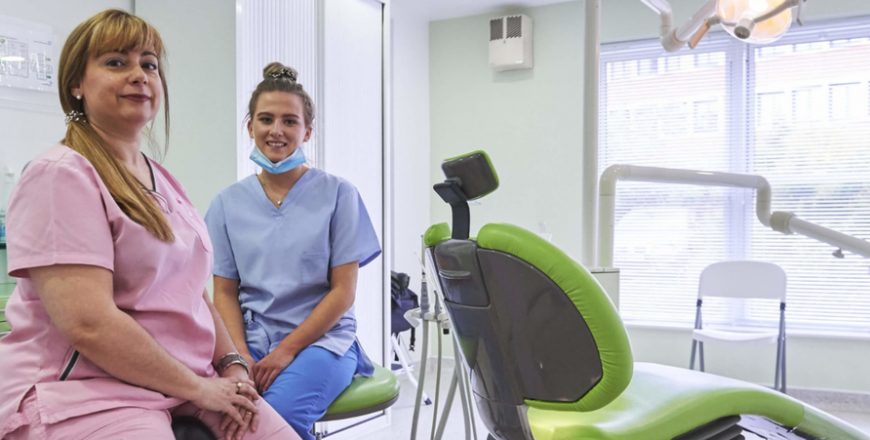
On a dental nurse apprenticeship course, you’ll help assist other dental health professionals, providing chair-side support and a high level of patient care.
A dental nurse’s work is meant to complement other professions. As an apprentice dental nurse, you will learn the skills and knowledge needed to support dental professionals at the ‘chair-side to deliver high-quality patient care.
Dental nurses may work in various clinical settings; therefore, this apprenticeship focuses on all aspects of clinical responsibility and duty and will provide you with the certification required to qualify for professional registration as a dental nurse with the General Dental Council.
You’ll learn about health promotion and disease prevention, infectious disease transmission and prevention, materials, equipment, and resources, as well as how to advise patients on oral health maintenance, prepare and maintain the clinical environment before, during, and after dental procedures, and care for and manage the needs of patients.
What you’ll learn
On a dental nurse apprenticeship course, you’ll learn to:
- Adhere to legal and ethical responsibilities in line with the General Dental Council’s requirements.
- Accept responsibility for the integrity of your activities and completed product while recognising your knowledge and expertise’s limits.
- Comply with the most current best practices guidelines.
- Effectively manage one’s own time and resources.
- Provide chairside help during dental procedures.
- Maintain patient-centred care by monitoring, supporting, and comforting patients at all stages of their treatment.
- Communicate appropriately and compassionately at all times and via all media.
- Maintain patient confidentiality at all times.
- Work safely and efficiently in a healthcare environment.
- Select and prepare the equipment, instruments, and supplies.
- Maintain and test equipment in line with local policy, procedures, and your own work.
- Manage effective decontamination and infection control procedures in line with applicable laws, regulations, and best practices.
- Create and keep correct and up-to-date patient records, such as social, medical, and dental histories, while securely preserving and archiving them in line with the law.
- Make good decisions regarding the patient’s safety while taking a radiograph.
- Provide appropriate, evidence-based oral and general health advice.
- Recognise and promote action in the face of medical emergencies.
- Capable of responding to medical emergencies and performing cardiopulmonary resuscitation.
- Take part in the assessment and ongoing review processes.
- Participate in events that foster continuous professional development.
- Consider how your daily practise conforms to the General Dental Council’s continual growth requirements.
- Comply with the Personal Development Planning Requirements of the General Dental Council.
- Participate in quality improvement efforts as required.
- Be collaborative and work as part of a team.
Entry requirements
You’ll usually need:
- Depending on the employer, but likely GCSEs or equivalent qualifications.
- Apprentices without level 2 English and maths will need to achieve this before taking the end-point assessment.
Assessment methods
The End Point Assessment comprises three distinct assessment methods:
- Knowledge Test
- Observation of Practice
- Interview underpinned by a portfolio
Duration, level, subjects and potential salary upon completion
- Duration: 18 months
-
Level: 3 – Advanced Apprenticeship
- Relevant school subjects: Science
- Potential salary upon completion: £22,000 per annum
Apprenticeship standard
More information about the Level 3 Dental Nurse Apprenticeship standard can be found here.
Apprenticeship end point assessment
For more information about the End Point Assessment Process, please read the Institute of Apprenticeships’ information page.
